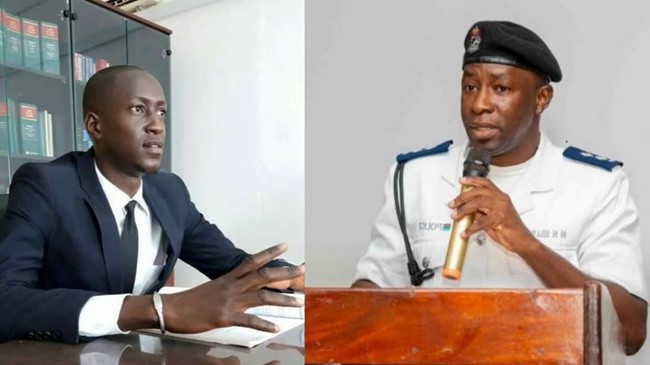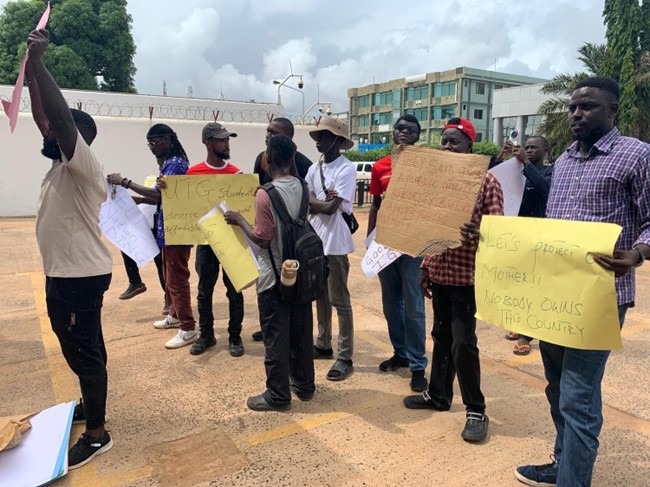The Gambia Police Force have intervened in numerous public gatherings and demonstrations recently, dispersing crowds and arresting civil society activists on allegations of unlawful assembly.
Currently, some 30 advocates are facing unlawful assembly charges in court, sending a chilling message to others considering embarking on peaceful protests – a fundamental right to freedom of expression.
Often, protesters are denied permits by the police, but Are Permits Required for Public Gatherings and All Protests? Our reporter sought answers from the Police and a lawyer, on the legislative framework guaranteeing freedom of assembly and the legal limitations.
‘August Assembly’
On 23rd August, 2025, the Gambia Police Force issued a statement on their social media noting that “the group, identified as Gom Sa Bopa, stage a protest against alleged mobile credit data deductions without applying for the required police permit”.
On that occasion, 23 individuals were arrested and later charged in court with unlawful assembly.
Less than a month later, on 16th September, 2025, the Gambia Police Force issued another statement on their social media page warning that “the request for protest permits is undergoing normal screening and processes. Subsequently, until such permit is granted, no individual or group will be allowed to stage a protest as required under the Public Order Act.”
The statement, which was in response to three requests for protest permits from Gambians Against Looted Assets (GALA), added that “all unauthorized gatherings from any individuals or groups within the named locations [National Audit Office, Kanifing Court and Westfield] will not be tolerated by the police.”
A week later, some four advocates were arrested and charged with unlawful assembly for demonstrating against the forceful removal of the Auditor General outside the National Audit Office.

Relevant Laws
Section 25 of the 1997 Constitution guarantees citizens rights to “freedom of speech, conscience, assembly, association and movement.”
It sates that “(1) every person shall have the right to
(a) freedom of speech and expression, which shall include freedom of the press and other media; and
(d) freedom to assemble and demonstrate peaceably and without arms.”
Asked if the Police have the authority to authorize gatherings, Police Spokesperson Sisawo said that “the Police have the authority as per the Public Order Act and other related regulations, i.e. the Constitution”. He did not cite relevant sections of the law.
According to Barrister Ndure “as per Section 25 of the Constitution, every person shall have the right to freedom of assembly and to demonstrate peacefully and without arms. However, this right is not absolute. It must be exercised in consideration of other laws.”
Ndure also said that Section 25 (4) of the 1997 Constitution stipulates that these rights are subject to laws that impose “reasonable restrictions” necessary in a democratic society, particularly in the interests of national security, public order, decency, and morality.
The Police statement makes reference to the Public Order Act, a colonial-era law from 1961. It is “an act to prohibit the maintenance by private persons of military or similar character, and to make provision for the preservation of public order on the occasion of public processions, and to make provision for the control of the use in public or apparatus for amplifying sounds, and for connected matters”.
The relevant sections of the Public Order Act requiring permits are as follows:
Section 5(1) of the Public Order Act titled “Control of Processions” states that:
“The Inspector General of Police in the City of Banjul or the Kanifing Municipality or, in any of the Regions, the Governor or other person authorized by the President may direct the conduct of all public processions and prescribe the route by which and the times at which any procession may pass”.
Section 6(1) “Control of Loudspeaker” states that:
“A person shall not use any megaphone, loudspeaker or like apparatus for the amplifying of sound (whether of an electrical nature or not) in a public place, or in any other place in such a manner as to be heard in a public place without the prior written consent of” the IGP and relevant authorities.
Turning our attention to citizens right to protest, our reporter asked if a permit is required for all protests. In response, the Police Spokesperson noted that a permit is not required for all public gatherings or protests.
In agreement with the Police Spokesperson, Barrister Ndure said that the Public Order Act requires anyone planning a public procession, defined as a group walk or demonstration in a public place, to first obtain a permit.
“If you want to demonstrate or conduct any public procession, or even use a loudspeaker, you must get a permit,” he said.

Not All Gatherings
However, not all gatherings require permits, as Barrister Ndure explains, only those that meet the legal definition of a public procession or involve the use of loudspeakers in public spaces. This excludes private gatherings.
“Any event that qualifies as a public procession requires a permit. But if it’s not a public procession and doesn’t involve loudspeakers, it does not qualify,” Ndure said.


